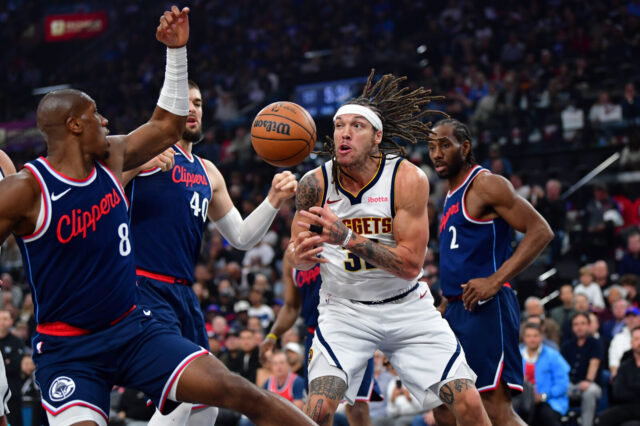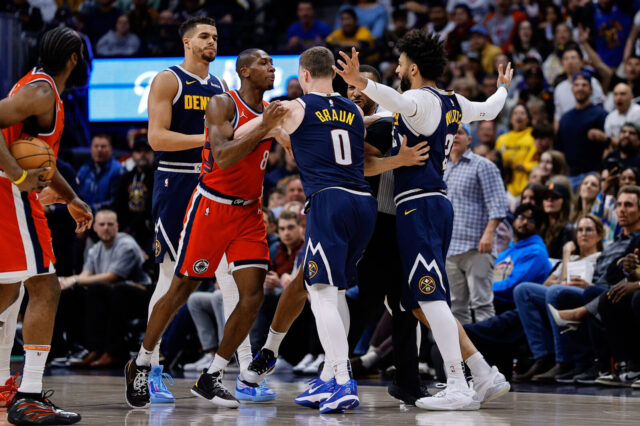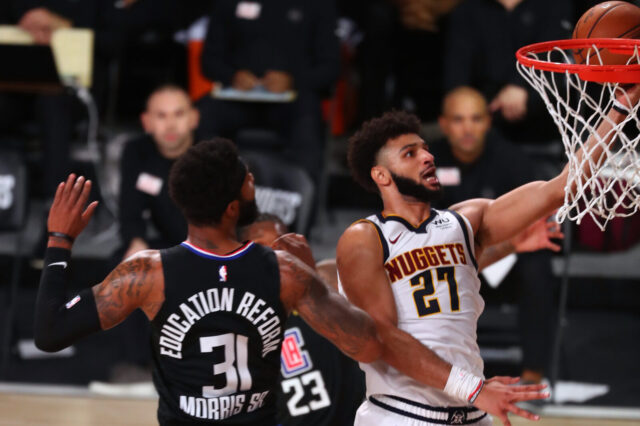This hoop. This one right here…
This content is no longer available.
Two or three times a week, this is where I get my ass handed to me by a tenacious, single-minded six-foot tall power forward. The only upside of the regular whupping is that I get a kiss at the end.
I should probably mention that I’m married to the power forward.
There’s a picture in my wife’s high school yearbook, one of she and a competitor going up for a rebound. My wife’s face is all determination and focus. The other’s girl’s face is a bit more of a pained rictus. My guess for the latter is how deeply my wife’s knee is buried in her gut. I’ve asked for assurances I will not be treated similarly in the backyard. Thus far, I have received none.
In recent years, the phrase “you play ball like a girl” was one of the deepest insults one male could throw at another. The first time I saw the scene from The Sandlot above, I howled for a couple minutes. The phrase was the triple-dog-dare of my youth basketball, baseball, and soccer leagues. Comparing a boy’s skillset to a girl was tantamount to the Cold War. You could go there, but you’d better be prepared for some bad stuff to follow.
Times have certainly changed. When you look around these days, saying “you play ball like a girl” might be one of the more flattering phrases one could utter, depending on which girl you’re being compared to. I know if someone told me I played ball like my wife, I might kiss them too. Maybe at the next Stiffs Night Out.
But fifty-plus years after the feminist movement really began to take hold in America, and in this blossoming era of equality, conversation, and insight, here’s what it means to “play like a girl” in 21st century basketball terms:
On the court
The NBA founded the fledgling WNBA in 1996, to what amounted to mixed interest at best, though many leagues look for an audience at inception. The idea of the league gained momentum after the USA Women’s Basketball gold medal run at the 1996 Olympics. With names like Sheryl Swoopes, Rebecca Lobo, and Lisa Leslie a part of the league’s inception, the WNBA had familiar names to roll out onto the court every night. Though the league has endured it’s ups and downs along the way, attendance is back on the rise, garnering over 1.5 million fans to stadiums last year. Three of the founding eight teams are still in the league 22 years later, and there are now 12 clubs playing in total. More recent stars like Brittney Griner, Elena Delle Donne, Maya Moore, Skylar Diggins-Smith, and more bring exceptional play and name recognition to the still-growing league.
Oh, and remember Lusia Harris? Did you see her reverse slam last week? If you said yes, you’re not remembering the right person, as Harris was actually the first woman officially drafted by an NBA club, in 1977 by the New Orleans Jazz. How highly regarded was “Lucy” that year? She was drafted ahead of 33 men. She’d averaged 25.9 points and 14.5 rebounds in college, with 31.2 points and 15.1 boards per game in her junior season. Though she never played for the Jazz, she eventually went on to play briefly for the WBL’s Houston Angels.
On the bench
Women in the coaches seat used to be the stuff of folly, but the NBA now has three female assistant coaches, with Nancy Lieberman and Jenny Boucek joining first-to-the-party crasher Becky Hammon. How successful has Hammon’s journey been thus far? She was the first woman to ever interview for an NBA head coaching position, and looks very likely to head a team sometime soon. She’s also a proud part of Colorado sports history, having led the Colorado State University Rams Women’s Basketball team through their most prolific era. As someone lucky enough to have met her a few times during that era, I can also report that she’s a very smart, clever, and decent human being. Hammon went on to Olympic and WNBA success before steadily climbing the ladder behind the San Antonio Spurs’ Gregg Popovich. Her credentials are unimpeachable, and it looks to be a lucky team who takes the chance on her steering the ship.
Circling back to Lieberman and Boucek, both have been a part of the Sacramento Kings bench in the past, and Boucek recently joined the Dallas Mavericks bench. She also saw great success in the WNBA as a head coach with the Sacramento Monarchs and Seattle Storm.
Blowing the whistle
It’s been 21 years since the NBA hired it’s first female referees, but Lauren Holtkamp is the only female official in today’s NBA. Definitely room for growth here.
In the media
Within the last few decades, women in sports media have thrived and taken a powerful hold of the voice of many sports, and not many more progressively than the NBA. From the lofty heights of ESPN, who has Doris Burke as one of their best analysts calling games, to Jemele Hill, who is blessedly better known for her polarizing positions than her gender, strictly because the opinions she comes with are well-informed. Cheryl Miller is a wise and engaging voice for Turner Sports. Long gone is the era of the ill-informed 10 second fluffy sideline report, with that sideline role now an integral part of game insights for every broadcast team.
Locally, the Denver Nuggets are also well represented on several fronts, with the exceptional Katy Winge a part of the team’s reporting and production crews, and Denver Stiffs own Ashley Douglas and Kayla Osby key components of Stiffs successes, and recently celebrated by SB Nation in a four-part series featured here on SB Nation.
In the Stands
Here’s where the league still has room to grow, with only 30% of their attendees being women, tied for worst amongst the major sports. That said, as the league’s demographic continues to skew younger, that ratio continues to improve as well. As the league continues it’s efforts to further reach out to the female demographic, and as the voices and personalities that surround the game continue to skew further towards women as well, the NBA hopes that one of these days the fanbase may turn further in the same direction. Don’t believe me? The best part of writing this was that there were dozens of other names that could have been represented here in nearly every category.
The voice of the NBA has risen ever so slightly in pitch, basketball fans. But it is certainly more educated and broad for it. Now if you’ll excuse me, I have to go out back and see if I can figure out how to play ball like a girl.
This content is no longer available.


